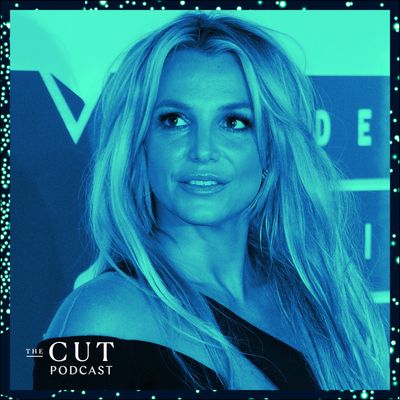
The Cut
Subscribe on:
This week on The Cut, co-host Jazmín Aguilera speaks with senior writer Angelina Chapin, whose recently published article “The Vindication of #FreeBritney” explores Britney Spears’s most dedicated fans, the drivers behind a movement that has captured the national spotlight. They discuss, with clips from fans interviewed for Angelina’s piece, why people tend to become die-hard supporters of celebrities they don’t really know, the events that led to #FreeBritney’s nationwide popularity, and how Spears’s fans view themselves as social activists, rather than simply supporters of a pop star.
To hear more from some of the most dedicated advocates of the
#FreeBritney movement and for thoughts on what our recent interest in it might say about today’s culture, listen below — and subscribe for free on Apple Podcasts or wherever you listen. You can also read the full transcript below.
CLIP OF #FREEBRITNEY SUPPORTERS PROTESTING: FREE BRITNEY, NOW! FREE BRITNEY, NOW!
JAZMÍN: Do you remember the first fan? It makes me think of this first fan of Britney’s that went public for being distressed.
CLIP OF #FREEBRITNEY SUPPORTER VIDEO: LEAVE BRITNEY ALONE!
JAZMÍN: That person?
ANGELINA CHAPIN: Yes!
CLIP OF #FREEBRITNEY SUPPORTER VIDEO: Please!
ANGELINA: With mascara running and that grainy YouTube video?
CLIP OF #FREEBRITNEY SUPPORTER VIDEO: I love you Briney just know that okay? Just know that.
JAZMÍN: Yes. Everybody made fun of it. I saw a Tweet the other day that said, we owe that person an apology. It could have been like a scene as a fringe-fanatic obsession. Now, it’s just grown to the point where the people have taken this on as like a social movement, as a social cause.
ANGELINA: Yeah and I think that’s what’s interesting about this movement. It only coalesced very recently.
JAZMÍN: That’s Angelina Chapin, senior writer at the Cut.
ANGELINA: The movement has just been fueled by things that fans want to see a narrative that they’ve created of this sort of Rapunzel, stuck in the tower, who they need to save. Guess what? That turned out to be true.
JAZMÍN: Okay, so as a kid I was a totally average Britney fan. I had the …Baby One More Time CD and would play it on my Walkman, but it was just part of the rotation. Just another CD in the CD binder–next to The White Stripes, Toni Braxton, or The Space Jam soundtrack. I liked her, but she didn’t exactly change my life or anything.
So yeah, I remember being online and seeing Britney fans upset about something but I kinda just took it as like, the Internet. Stan culture. Cardi vs. Nikki. That kind of thing. I just didn’t take Britney fans seriously enough to stop and actually listen to what they were saying. So now that we realize they were right all along I’m trying to figure out, how exactly did we get here? All the way to banners on the freeway and rallies in front of L.A. courthouses? What is it about this one pop star that makes people not just care, but care enough to start a movement?
JENNIFER PRESTON: I just, I feel like this soul connection to her.
KEVIN WU: At the time I wanted to be a popstar myself.
BRITNEY FAN: And she was everything I wanted to be, she was the big sister I never had. I looked up her.
HAYLEY HERMS: I still have tabloids in storage with her face on it. I gave my dog her birthday.
AMANDA ECK: Ugh I’m sorry. I’m getting emotional. I love her so much.
ANGELINA: I mean, whenever you have a formative experience in high school and there’s someone who’s part of it, you never forget that person. When I was speaking to fans, a lot of their connections to her had to do with, “Oh, well I was in high school and dealing with mental illness for the first time when she was having her very public meltdowns. So seeing her go through that helped me,” or “Seeing her on stage with confidence in this open sexuality helped me as a 14 year-old dealing with hormones.”
KEVIN WU: I think Britney Spears represented this persona that I wanted to be at the time.
ANGELINA: I was speaking with a gay man who was closeted and Britney helped him come out because of her confidence.
KEVIN: I just felt like pop stars were the most powerful people in the world. As a kid, you know, growing up gay in suburban Virginia, I just felt like I wanted to be heard. Now, as an adult looking back on it, I think there was definitely a story of identity and control that was at play.
She was you know, and trying to navigate, being told how to be and what to do. She was always wrestling with her team, even now, even today, about how she should present herself to the world And I think that resonated with me. Then and now.
JAZMÍN: A lot of people have a story like this. They’ve been rejected or abandoned or betrayed or bullied by someone, and in came Britney to fill the void. Like this other fan Angelina talked to.
ANGELINA: She was raised without a mother, so raised by her single father.
AMANDA ECK: I was probably five or six when …Baby One More Time came out. At that time, I was listening to my dad’s hair bands and he felt that “Highway to Hell” was not an appropriate song for a five to six year old. So, he introduced me to Jessica Simpson, Christina Aguilera, and Britney. He had me watch all their music videos and he pretty much was like, “Pick one. Any of them. Whoever you like.” For whatever reason I saw Britney and I was like, Her, dad. Her. I like this one.
ANGELINA: Britney sort of became a stand-in older woman, older sister-type figure where she just didn’t have anyone to teach her how to paint her nails or to dress a certain way or to have confidence. She really looked up to Britney to fulfill that gap in her life.
AMANDA: I loved her from that moment and I had memories of the …Baby One More Time era, Oops era. But it was really… oh God, I’m going to try not to cry. It was really seeing her in the role of Lucy in Crossroads, where her mom left and it was just her and her dad that I was like, Wow. I was at that time probably like 10, so I knew it wasn’t actually Britney, but just to see her in a role of a situation that was so unique to my life created a bond, especially when I didn’t have a mom. Seeing that and realizing, I can be normal.
JAZMÍN: Here’s the thing–to be a celebrity is to be whoever your fans most want to see. Britney is a blank enough space that she can be your substitute mom or your cool older sister or a gay fairy godmother. Her fans can project pretty much anything they want onto her. And, listen I don’t say that in a judge-y way at all– I have my fair share of projections. In high school, I was obsessed with Winona Ryder ever since I saw the 1989 movie Heathers.
HEATHERS CLIP: Dear Diary, my teen angst bullshit has a body count. I’ve got no control over myself when I’m with JD. Are we going to prom or to hell?
JAZMÍN: In Heathers, Winona is this misunderstood, alternative girl–which is how I saw myself. So when I found out the real Winona got arrested for shoplifting back in 2001, I was like, “Hell yeah she’s probably making a statement: Down with capitalism! Fuck corporate greed! But in reality, I did not know Winona Rider at all. Winona didn’t stand for whatever cultural values I was projecting onto her character. She was just this famous 30 year-old woman, having a really hard time.
Celebrity projection is nothing new. But I do have to say, Britney Spears is basically tailor-made for maximum fan projection. Think about it. Not only was she marketed for years as the naughty but nice international pop star girl-next-door, but for the past decade she’s been almost completely silent. Aside from occasional innocuous Instagram post, she didn’t speak publicly for years, and fans have been able to fill in the blanks with the type of victim narrative they want to see. And they are determined to save her.
ANGELINA: Before 2019, there were fans who were suspicious of the conservatorship. Certainly, were asking questions on corners of the Internet, but there weren’t protests. There wasn’t an official Free Britney hashtag. It was just sort of privately people saying to themselves, Why does her father control her life when she’s selling platinum albums and has a successful residency in Vegas? So just questions. Then, the smoking gun that brought everyone together happened in 2019, when this podcast called Britney’s Gram, aired a voicemail that was from this anonymous man.
CLIP FROM BRITNEY’S GRAM: I cannot disclose who I am.
ANGELINA: Claiming to have been a paralegal on Britney’s conservatorship team, saying basically, “Yes, she’s been controlled. She was forced to cancel her Vegas tour. She was forced into a mental hospital over the past few months.”
CLIP FROM BRITNEY’S GRAM: But there is no end particularly in sight for this stay at the mental facility. She did not want to go.
ANGELINA: Confirming a lot of the hypotheses that fans had harbored in isolation. And then, immediately, #FreeBritney exploded.
AMANDA: I always had something in the back of my mind, and things just kept happening. Then I was like, My intuition is telling me this is not right. The second we heard about the voicemail on Britney’s Gram, I was like, I work in law. I don’t know how accurate this could be. The guy can’t say who he is, because that’d be illegal. But this matches the feelings that I have had for so long. I’m on it.
ANGELINA: I think that podcast Britney’s Gram, they posted #FreeBritney, and told people to share this and it just spread like wildfire. Then the protests started and that was the modern incarnation of the Britney army.
CLIP FROM BRITNEY’S TESTIMONY: I will be honest with you. I haven’t been back to court in a long time because I don’t think I was heard on any level, when I came the last time.
JAZMÍN: On June 23, 2021 in a virtual courtroom, Britney Spears testified in front of Judge Brenda Penny. Her testimony basically confirmed everything Britney stans suspected about her conservatorship.
CLIP FROM BRITNEY’S TESTIMONY: After I’ve lied and told the whole world I’m okay and I’m happy, it’s a lie. I thought, I just, maybe if I said that enough. Maybe I might become happy because I’ve been in denial. I’ve been in shock. I am traumatized.
ANGELINA: I think the testimony put to bed a lot of those skepticisms and criticisms of the movement, but it was certainly a fair point until we heard her actually say in her own words, I want out.
JAZMÍN: So, that’s what happened. These Britney Spears super fans from around the world caught prodigious amounts of Internet shit throwing, and yet, still managed to make themselves a little revolution.
AMANDA: I know that the fans, we have been our own activists. Sorry, it is hard to switch that mindset sometimes. Like, Oh, I’m not being a fan right now.
ANGELINA: This is whenever I would slip up and say fans or, if they would by accident, they’d correct me. And say, “This isn’t about Britney, the celebrity. This is Britney, the human. We’re activists. We’re advocates.
JAZMÍN: After spending months watching advocates rise up and come to Britney’s defense, I guess at this point my biggest question isn’t why, but why now? Britney Spears has been in a conservatorship since 2008 and it’s only in the good year 2021 that the dam broke on this issue and people became determined to learn the truth. In a situation that is now pretty universally agreed to be all kinds of fucked up, how has it taken over a decade for this to become a thing?
More, after the break.
JAZMÍN: I have this theory I want to run by you.
ANGELINA: Please, I love a theory.
JAZMÍN: Do you remember a little back when America’s Next Top Model was available to stream? I forget on which platform, but all of a sudden all of the old seasons from like the thousands and the odds were available stream, we all started bingeing it and realizing how terrible it was?
TYRA BANKS, CLIP FROM ANTM: So, Danielle, you went to the dentist but you refused to have your gap closed. You really think you can have a Covergirl contract with a gap in your mouth?
DANIELLE, CLIP FROM ANTM: Yeah, why not?
TYRA, CLIP FROM ANTM: This is all people see. It’s “easy, breezy. beautiful, Covergirl. It’s not marketable.
DANIELLE, CLIP FROM ANTM: Yeah just a lil bit is okay, but I don’t want to completely close it.
JUDGE, CLIP FROM ANTM: Well I guess she just left the gap wide open for another girl, baby.
TYRA, CLIP FROM ANTM: I agree
JAZMÍN: And everyone took to Twitter, it backlashed on Tyra. She had to address it and say, like, “Yes, I agree with all of you guys.” It was like this reconciliation of all of the hurt from that era. But in that case, there was nothing. There was no resolution other than to just have someone apologize for it. You couldn’t undo that harm.
ANGELINA: Right.
JAZMÍN: In Britney, not that you can undo the harm that’s already been done, but in Britney. She represents a physical manifestation of that. But you can actually save her. You can act. There’s an action that can be put into place that will change her quality of life. I think that is what everyone has latched on to.
ANGELINA: Yeah, there’s a real chance for redemption here and whether that goes deeper than just Britney having her life back to sort of people who grew up with her, and who saw the way the paparazzi treated her, or just aspects of the culture that we all cringe at now. Could she help us reconcile all these now embarrassing, toxic, dangerous moments that we thought ten years ago were fine, whether it be stereotypes of people, or whatever harmful narratives we ourselves were part of perpetuating at the time? It does feel like this could be a reset on a more personal level for people and a sense of justice and validation.
JAZMÍN: Basically the late 90s and early aughts was a very cruel time, especially for women. Enough time has passed now that we can see that, and we want to make it right as much as that’s even possible decades later. Speaking as someone who lived through the trauma of shopping for low rise jeans, I can say there is something very affirming in seeing one casualty of the early-aughts misogyny get her redemption in the public eye. Nature is healing.
But for the diehard Britney fans who latched onto her and didn’t let go, that redemption isn’t just cultural. It’s personal.
AMANDA: I can remember, so clearly the shift of people–their feelings toward her. Even 2006, it was friends that I had that used to love her with me. We’d have slumber parties and that sort of thing, that then would be like, You still love her? She’s so outdated. or She’s crazy. Are you crazy too? Or, So are you going to shave your head? You should just shave your head. I know at one point, there were rumors going around about her possibly being suicidal, and kids are mean, and they’re with them. So if she dies, are you just going to kill yourself too?
ANGELINA: Wow. Kids are intense.
And she was reading me some of the messages that she’s been getting, especially women just saying, Hey, I’m really sorry for bullying you. I see. Now you were just a woman standing up for another woman before it was popular to do so.
AMANDA: Without naming names or anything like that I had a couple of people, specifically from high school that, they didn’t say the worst things possible, but they weren’t nice, that reached out with article about her conservatorship. Just say, I’m so sorry for how I treated you. Now I see what you saw then and thank you for being a voice this whole time. Hearing that, it’s not so much caring about what people think, it’s just more so validation that I’ve been doing the right thing for myself this whole time. And that’s just supporting a woman.
JAZMÍN: As good as it feels to see Britney and her fans get a bit of redemption, I have to wonder what will come out of this–after Britney is #freed.
CLIP FROM #FREE BRITNEY SUPPORTER: There’s so much conservatorship abuse that goes on not just in Britney’s case, but in so many other cases.
JAZMÍN: When I see the kind of conversations that are coming out of the #FreeBritney movement, I have to say I feel hopeful! No one two years ago was talking about exploitative conservatorships or the exploitation of child stars. Now, suddenly it’s everywhere. That’s got to be net good, right?
ANGELINA: I hope so. That’s a very optimistic take and I like it and I want to believe it. I do think we are obviously progressing in terms of these kinds of dialogues. Whether it be about race or feminism, whatever, but I do worry that maybe our limits of caring stop and end with again, a famous, beautiful conventionally, attractive white woman. Do we care about the immigrants who were subject to forced sterilization in ICE custody? We hear this awful anecdote about Britney Spears, having her IUD in, not being able to take it out, even though she wants kids and everyone’s horrified, but a lot of the stuff that she’s going through–so many marginalized people go through every day and no one cares about it. So a question I have, is will we extend this concern, nevermind to other people in conservatorships, the exact same situations, but to women, to non-white women, to poor women, to queer women? How far can our empathy for someone like Britney Spears really extend to the groups most affected?
JAZMÍN: Yeah. I mean, it could go either way. It could be like, Britney Spears is the gateway drug to radicalization. Like, I got radicalized by Britney Spears.
As of Tuesday evening June 20, 2021, two representatives from Congress have introduced legislation allowing those placed under conservatorships the right to petition the court for a public guardian to replace a court appointed guardian. The bill is named the FREE act.




